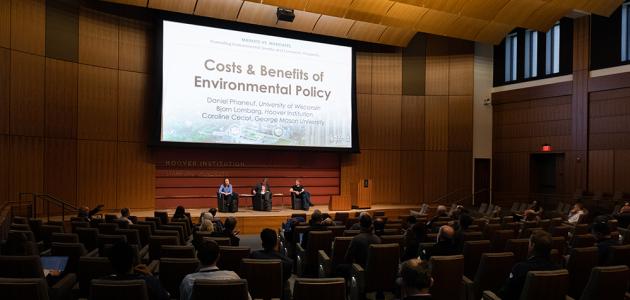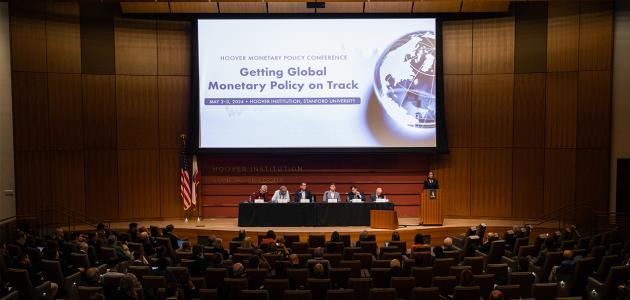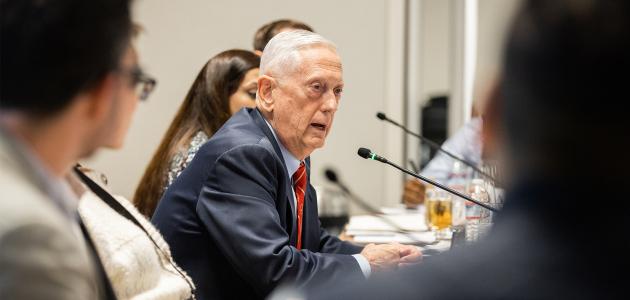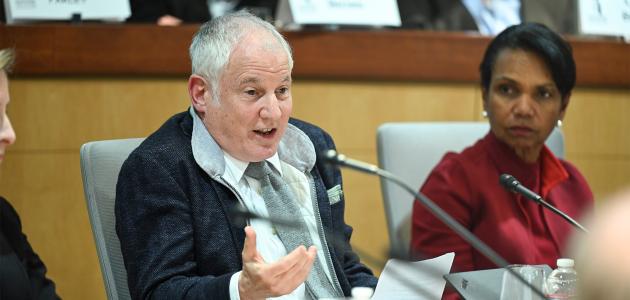
Featured Analysis

Markets vs. Mandates Conference Explores Best Approaches to Environmental Sustainability and Economic Prosperity
As the global response to climate change progresses, the Hoover Institution hosted its second annual Markets vs. Mandates conference on April 8. It was a publicly accessible conference in which a wide array of speakers discussed how market-based mechanisms and government regulation can safeguard the natural realm and promote economic prosperity.
Led by senior Hoover economists Terry Anderson and Dominic Parker, the conference sought to foster discussion and debate on how market-based and regulatory frameworks can best govern responses to various environmental concerns, including safeguarding natural areas, managing agricultural land and wildlife, and curtailing greenhouse gas emissions.
Topics also included whether public companies should be mandated to disclose their annual carbon emissions and other environment-relevant data, how poor access to wildfire data is roiling the California home insurance market, the unintended consequences of environmental mandates, and the true scale of the effort needed to achieve a global energy transition.
New York Times columnist Bret Stephens gave a keynote address in which he suggested that media coverage, commentary, and even academic literature about climate change appear to have acquired subjective, dogmatic, and even antidemocratic tendencies.
More on the conference can be found here.
Highlights

World Bank Climate Change Policies Leaving Global South Worse Off: Bjorn Lomborg
By diverting ever more of its resources to climate mitigation projects, the World Bank is forgoing the opportunity to accomplish some of its most economically and socially impactful sustainable development goals, visiting fellow Bjorn Lomborg asserted in a talk to Hoover fellows on April 1.
Saying that climate transition work could take up to 45 percent of the World Bank’s budget by 2025, Lomborg walked through twelve other impactful projects it and other global organizations could pursue instead. These projects included a global effort to eliminate tuberculosis, a global student nutrition program, advanced agricultural research, and a global anti-malaria program.
While he estimates climate mitigation projects deliver only 17 cents of economic benefit for every dollar spent, each of the twelve projects he discussed delivers at least $15 of economic benefit for each dollar spent.
More of his discussion can be found here.
Related to the relative costs and benefits of green energy projects, Lomborg wrote in the Financial Post that governments are failing to account for the total all-in cost of wind and solar power generation.
He says that governments are failing to account for the costly backup generation (usually comprised of fossil fuel sources) and battery storage needed to maintain constant energy generation when the wind doesn’t blow and the sun doesn’t shine.

Hot or Not? Steven Koonin Questions Conventional Climate Science and Methodology
In a recent interview on Uncommon Knowledge with Peter Robinson, senior fellow Steven Koonin says that while human activity is one of the main culprits of carbon dioxide emissions, the science on how those emissions will actually alter the climate is far from precise. “Human influences are a 1 percent effect on a complicated, chaotic, multiscale system for which we have poor observations,” he tells Robinson in the episode.
Click here to watch the episode.

Moving to Adaptation? Understanding the Migratory Response to Hurricanes in the United States
Using data on the paths of all known hurricanes in the Atlantic Basin between 1992 and 2017, Hoover Institution Kleinheinz Fellow Valentin Bolotnyy studied rates of migration in and out of all affected US counties during this period. He found that hurricanes have “little to no impact” on county out-migration on average. “Given existing policies and incentives, the economic and social benefits that people derive from living in high-risk areas currently outweigh the incentive to adapt to future storms by relocating across counties,” he and coauthor Arnold Patrick Behrer wrote.
Fellow Spotlight: Terry L. Anderson

Terry L. Anderson has been a senior fellow at the Hoover Institution since 1998 and is currently the John and Jean De Nault Senior Fellow (adjunct). He is the past president of the Property and Environment Research Center in Bozeman, Montana, and a professor emeritus at Montana State University, where he won many teaching awards during his twenty-five-year career.
Anderson is one of the founders of “free market environmentalism,” the idea of using markets and property rights to solve environmental problems. He is the author or editor of thirty-nine books, including Free Market Environmentalism for the Next Generation (with Donald R. Leal) and Adapt and Be Adept: Market Responses to Climate Change.






















